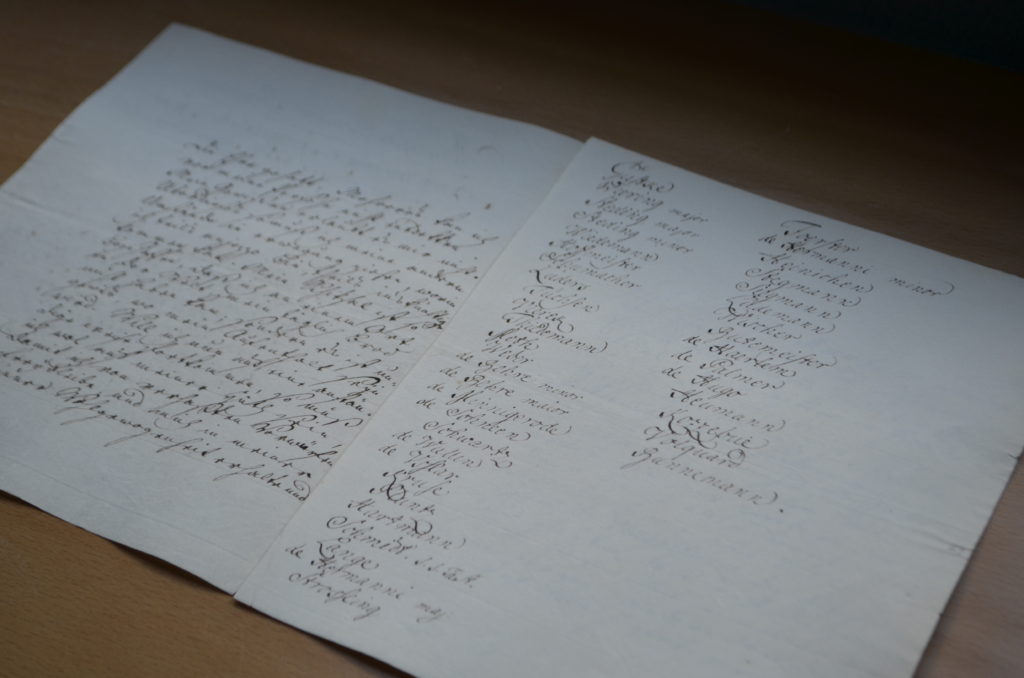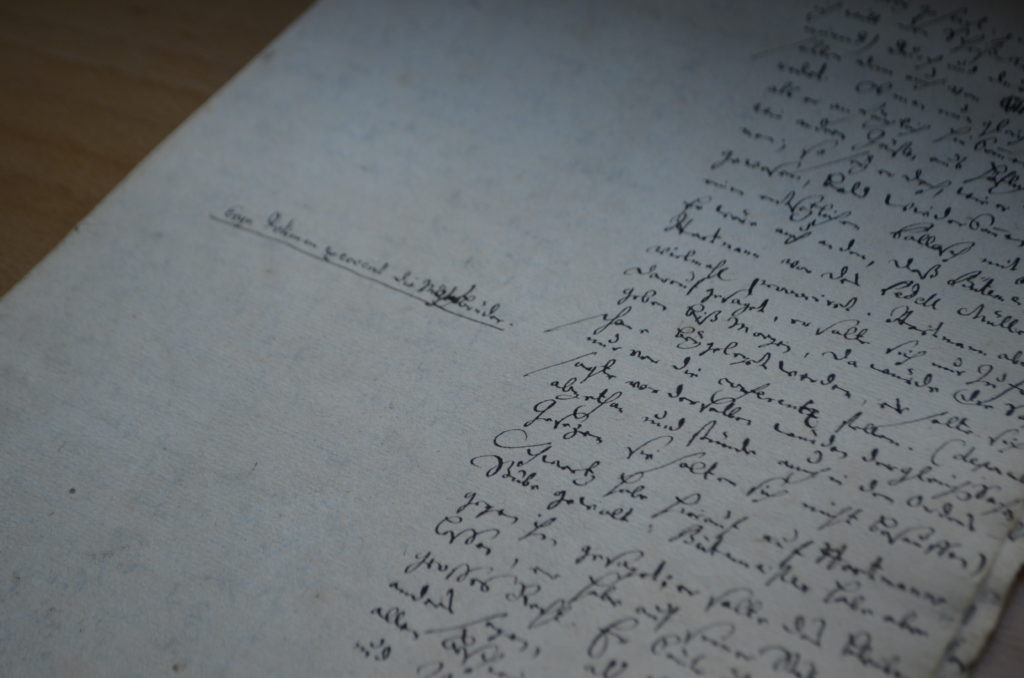The Actually Real Story of the Pug Order
A small dog, a secret lodge, the university of Goettingen – don’t belong together? Actually, they do! For a short period of time, there was indeed a secret association of the Georgia Augusta that was apparently only concerned with one thing: the pug. Teary eyes, murmurous breathing, deeply wrinkled forehead – which animal doesn’t scream “mysterious secret association” than a pug?! It’s high time for a search for clues.
The story begins just like many: on Wikipedia. Too much time, too little motivation for the actual tasks, click click click and suddenly, I’m seeing it right in front of me – the Order of the Pug! I’m having an epiphany about secret lodges: the rumors are true, everything is correct. Or, actually, nothing is. Well, everything is feigned by a chosen group of… pugs. How else have I never encountered the pug order during my time at the university before?!? One deep dive into the Cultural Studies Divisional Library later and I’m sure: it really existed. And yes, it existed also in Goettingen. Hold on to your tinfoil hats, turn on your telegram notifications and get ready to view the cute little lap dog with new eyes.

Your Majesty the Pug
My research leads me to the abysses of Georgia Augusta… or, the groundfloor of the Paulinerkirche. It is here where Holger Berwinkel, the university’s archivist, watches over the documents of the past 280 years. “We don’t know much about the pugs of Göttingen”, he admits – a nice first step for conspiracy theories of any kind – but he can at least show me the accounting book of the pugs and the protocols of the university’s trial against the pug order. German bureaucracy, reliable as always.
In the 18th century, the Georg August University wasn’t that much of a fancier of secret student associations as every TV documentary seems to be. After it succeeded in banning so-called Landsmannschaften (some sort of old fraternity-like association with students from the same home region), the until then short-lived order of the pug was about to be banned as well in 1748.
But to start over from the beginning: Secret lodges were very en vogue in the 18th century. Inspired by the Freemasons (Aha! It was only a matter of time until they pop up), from the 1740s on pug orders were formed all over Europe. “The pugs were geared to the Freemasons, left out the metaphysical part and especially concerning rituals and courtesy, they were much more playful and less serious”, Mr. Berwinkel explains to me. “They were a phenomenon of society as a whole. The founding of student orders did mostly happen because it was a social trend.”

“Playful” indeed, their rituals seem just as abstruse as they can get when a lodge is called “order of the pug”. For initiation, new members had to sit in front of the chamber door, whining and door scratching, until they were allowed in, only to be directed around in blind folds and a collar, making their way to a pug figure in order to kiss its butt. Like, what else?
“The order of the pug was actually a matter of the elite”, Mr. Berwinkel continues. Wilhelmine von Preußen for example, sister of Friedrich the Great and margravin of Bayreuth, “Großmöpsin” (the literal translation as “Grand Pug” cannot be verified, so let’s stick to “Grand Mistress” at this point) of the pug lodge. But even this is special: Back then, the order allowed women to become full members (a revolutionary step that even the Freemasons haven’t taken yet).
A short history of the pugetry of Göttingen
The Göttingen lodge of the order just doesn’t fit quite into the picture, though. First of all, Göttingen’s version was a student order, which in the 18th century meant “consistently male”. Second of all, a bunch of students were considered a few levels below the higher nobility. The archivist has a different assumption: Maybe the order wasn’t meant to be in a ‘puggy’ way, but was instead an unlabeled successor of one of the recently banned “Landsmannschaften”. Or, maybe some of the prospective Freemasons, who didn’t make the team in Göttingen, just organized themselves. Who knows.
“And what if it was an insidious lap dog, who wanted to win the favour of student after student until it gains world domination?” I am secretly asking myself. All of the options seem equally plausible to me!
For the time the order lasted, 3 months, it counted 50 members. Some of the university’s student associations today would be glad about this number, but back in the day it meant that every tenth student was a pug.

Nevertheless, the pugetry was over soon. The resean: two drunk lodge brothers who got into a fight. Followed by incarceration in the Karzer, interrogation of the arrested and a small but momentous note in the protocol by the syndic, the university’s lawyer: Ergo Iurisdictionem exercent die Mopsbrüder (of course, Latin! I knew the Illuminati were involved…)
Mr. Berwinkel translates, since my latin from schooldays fails: The pug brothers have jurisdiction! “They crossed a line, it was the university alone who had a disciplinary jurisdiction over the students”, he explains to me. If a student got into trouble, the university was allowed to excersize the punishment. Starting from a couple of days in the Karzer for public smoking, they were no limits upwards. “It could even result in death penalty, in case it got affirmed by Hannover.”

No pugs allowed
Why did the university take action against the pugs? Did they want to cover up an even darker secret? Am I tracking down the next Da-Vinci-code-Jesus-had-decendants-revelation (sorry, spoiler)? Mr. Berwinkel’s views are a little less extreme than mine, the magic word for him here is pennalism.

Pennelism, the exploitative paternalism by older students already existed in the middle ages. Financial dues, strange initiation ceremonies – “just as we might know it from American college comedies”, Mr. Berwinkel says. Only more medieval. In Göttingen, though, pennalism was supposed to be excluded from the get-go. “Everything had just started in Göttingen. The government in Hannover war nervous that this little plant will fully bloom and stand up against all the old universities.” That is why they put so much effort into establishing a serious university. They couldn’t afford pennalism and their own jurisdiction by orders and “Landsmannschaften” – a state within the state so to say. “The pug order came at an inopportune time”, the archivist concludes.
And then what? “Did the pugs leave any marks?”, I’m asking and wistfully hope for a “since then, they’re operating from the underground!”. But Mr. Berwinkel wouldn’t do me the favor. “No”, he says bluntly. The pugs were nothing more than a short episode in the history of the university. But is this supposed to be it? Why wasn’t there an order for french bulldogs? Isn’t it possible that people still secretly meet to whine behind doors and kiss pug butts? My search for the truth has only just begun…








